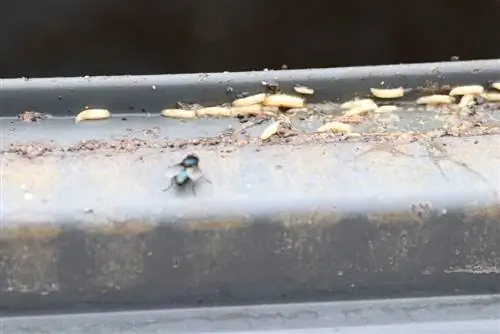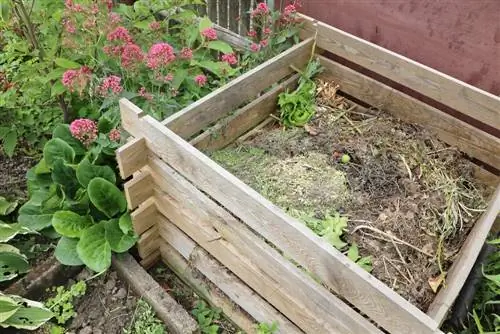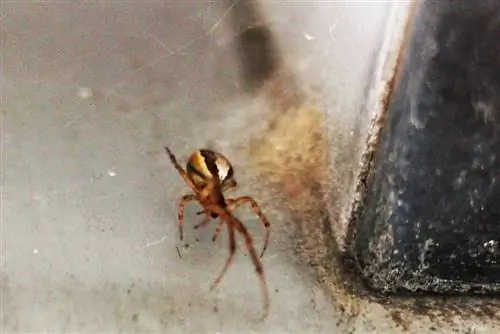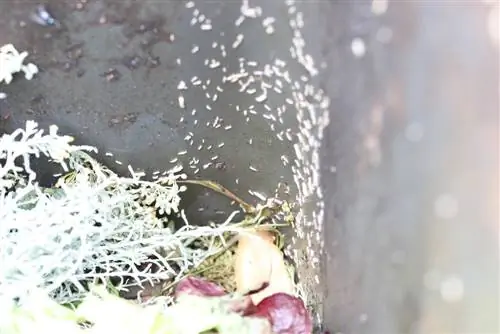- Author admin caroline@plants-knowledge.com.
- Public 2023-12-17 03:39.
- Last modified 2025-06-01 06:48.
Maggots are always created when flies lay their eggs on food. Especially in organic waste or household waste, an enormous population can develop and quickly become a disgusting factor. It is therefore particularly important to prevent flies and prevent them from laying eggs in the trash can.
Maggots in household waste can be avoided
Anyone who opens the trash can and is greeted by squirming white maggots will usually react with disgust and be less happy about the inhabitants of their trash can. The reason for maggots are flies that lay their eggs in leftover food and preferably in meat or overripe fruit. If the maggot-infested garbage is in the house or apartment, it is advisable to act particularly quickly. Maggots do not endanger your he alth, but they do produce a bad smell and cause goosebumps on the body.
The causes of maggots - this is how they get into the trash can
As already explained, the formation of maggots can hardly be prevented. As soon as there are flies in the apartment, you don't have to wait long for the maggots. Only regular waste disposal, as well as avoiding biological waste and preventing flies are really helpful. Once the maggots are in the trash can, various home remedies and of course going directly to the bin on the street with the trash bag can help. However, simply removing the garbage from the house does not combat the maggot problem, but only serves to relocate the disturbing roommates. Fly strips can work wonders in the summer months and prevent the common housefly population from developing to such an extent that egg-laying occurs. Diapers, leftover meat, and discarded fruit and vegetables are particularly attractive to flies. Anyone who puts the biological waste directly into the garbage can in front of the house is at least protected from maggots in the apartment and does not have to expect an unexpected greeting.
The natural fight against maggots
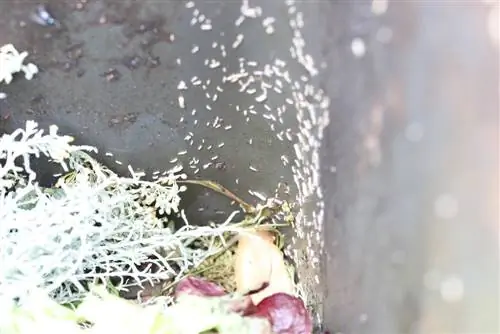
If you notice movement in the garbage can, you will immediately be confronted with the need to take action. Reaching for the chemical club is quick, but is completely unnecessary when it comes to maggots. With natural remedies, the days of maggots are numbered. The following home remedies prove helpful in combating maggots:
- hot water and pepper
- garlic
- Egg cartons
- Vinegar
- or a steam cleaner.
A mixture of hot water and pepper eliminates the maggot problem very quickly. To do this, mix the hot water with pepper and pour it directly over the garbage can filled with maggots. S alt is also suitable. If you sprinkle s alt over the garbage and do so generously, you will practically dry out the maggots and can enjoy the quick death of the unpleasant inhabitants. After emptying the garbage can, cleaning it with a steam pressure cleaner is optimal and destroys any remaining eggs. Newspaper or egg cardboard absorbs the moisture. Since the maggot only feels comfortable in damp garbage, making the garbage can dry prevents it from hatching. Garlic is also a helpful organic-based remedy. Add a few pressed toes over the trash and maggots will not develop in this habitat. To prevent maggots from crawling out of the garbage can, it should be properly closed. The garbage in the apartment is more hygienic if it is packed in special bags. Anyone who chooses organic bags makes a positive contribution to environmental protection and can help combat maggots.
Defend the beginnings - prevention against maggots
Since maggots are fly larvae, you should make it impossible for the flies to get into the trash can. A tightly closed lid on the garbage can plays an important role and prevents a fly from getting into the household waste or organic waste through an opening and laying its eggs there. The dry garbage can is not suitable as a habitat for maggots. If the floor is covered with egg cardboard or crumpled newspaper, the larvae from the fly eggs cannot develop and there will be no maggot infestation in the trash can. Under no circumstances should the rubbish remain in the house for too long. Even if the trash can in the kitchen isn't really full yet, you should take it to the trash can in front of the house every two days in the cold season, and preferably every day in the summer.
Maggots hatch very quickly and develop within a short period of time. But there is no basis for maggots in the apartment if the garbage is disposed of on a daily basis and the fly larvae are not given a chance to hatch. As an angler, you are happy about maggots and use them as natural bait when catching fish. But for every other homeowner or tenant, the maggots are associated with a major disgust factor and can be easily avoided with the right tips and tricks.
Produce less waste and reduce risks
Food that has been purchased or prepared in too large quantities is often thrown away. Since these form the basis for the development of maggots, they also serve as the cause of their formation. If you really want to effectively protect yourself from maggots and avoid them populating your garbage can or organic waste bin, you should handle food carefully and avoid unnecessary waste. Above all, leftover meat or overripe fruit, but also baby diapers, are an oasis of well-being for maggots. Since not all waste can be avoided, careful handling of the garbage can is an important factor in protecting against unwanted infestation. The discovery of maggots does not have to cause panic. Even if the disgust factor is very high, maggots are harmless and are not considered a sign of poor hygiene or uncleanliness. But they are particularly unpleasant in the house, so a certain level of cleanliness must be observed when emptying the garbage can.
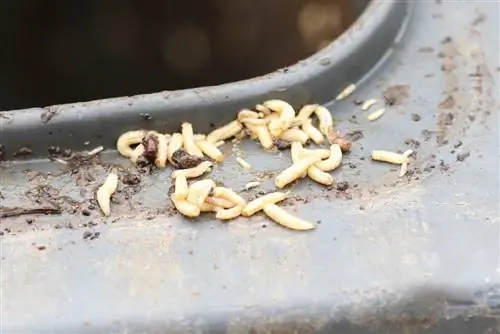
The combination of fly strips near the trash can and keeping the trash can dry have proven effective in preventing maggots. If maggots are already living in the trash can, you are well advised to use s alt or hot water and pepper. Fresh garlic, paper and even vinegar can drive away maggots and protect against a new siege.
What you should know about maggots in organic waste
Causes
- The maggots are fly larvae.
- Flies lay their eggs in spoiled leftover food. They prefer rotting meat.
- Under favorable conditions, fly larvae hatch from these eggs after just a few days.
- These then eat their way through the organic waste until they pupate and become adult flies themselves.
Removing maggots
There are several ways to get rid of maggots in organic waste. However, chemical clubs are not recommended here because they are usually not environmentally friendly. DanClorix, for example, should not be used as it is not 100% biodegradable. Vinegar, however, is very helpful against the white plague. Simply pour it generously over the trash can, close the lid tightly and leave it to stand, preferably warm, for a few days. The resulting fumes should also kill hardened fly larvae. It is also helpful to sprinkle quicklime over the organic waste, which suffocates the maggots.
You can also buy special cleaners for organic waste online or in hardware stores. This is usually litter that is simply sprinkled over the organic waste like lime. After the trash can or garbage can has been emptied outside, it must be cleaned thoroughly. Emptying does not guarantee that all maggots or eggs have been removed. The bucket or bin should best be cleaned with boiling water or a steam cleaner. Add a little vinegar and everything is free of maggots.
Prevention
- On the one hand, the garbage should always be put in a paper bag, newspaper or special organic waste bags.
- The bottom of the trash can should be lined with newspaper, which is changed after each emptying.
- This keeps the soil dry and food doesn't rot as quickly in the lower layers.
- Especially in summer, the trash can should be emptied every day to avoid spoiling food lying around the house.
- If the large bin outside is infected, it helps if the garbage thrown in there is packed.
- Here, too, it makes sense to line the floor with newspaper and change this after each emptying, even if it is a little more complicated.
- And no matter whether it's a large bin or a small trash can: regular cleaning never does any harm.

